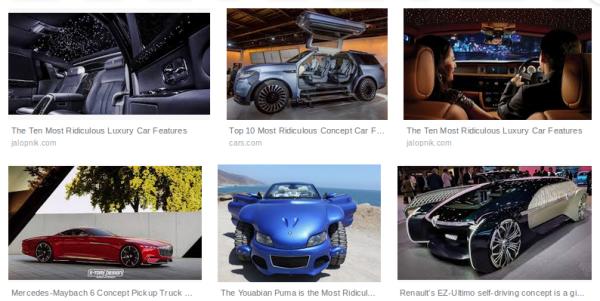One more proof that private Peak Car is here
The car of the future will be “more like a smartphone with wheels”. And this will also be its doom.
Says an article at the Guardian that the car of the future will be:
- “more like a smartphone with wheels than the kind of automobiles we see today”
- digitally operated and autonomous. [Therefore] it will likely include infotainment systems bigger and curvier than anything seen to date, allowing us to work or watch something while driven to destination
- connected to every other car and to the infrastructure, “to make them safe for driving”
It will be interesting to see what happens when this vision actually meets physics and human nature. Especially if you own stocks in any of the companies desperately promoting these dreams, of course.

Ridiculously overloaded cars, here we come!
</em></u>
Here is why:
- cars are not planes: what makes a lot of psychological and economic sense for people locked for 7 or more hours, without broadband connectivity, inside a narrow tube of metal that most of them perceive as way more dangerous than cars.. may be just not needed in other scenarios
- Inferior, overpriced alternative: for most people, especially young ones, there is no need for any other entertainment system than the smartphone they already own. Why should they pay a lot more for something way less customizable and replaceable than that, which they would use maybe 5% of their time? (assuming they wish and can afford to buy any car in the first place, of course)
- Connected? Yeah, right: the only scenario in which many driverless cars could be connected enough to other cars and the infrastructure to be really safe is when and where 5G networks are both ubiquitous and performing as their marketing says. I strongly suspect most car manufacturer would go bankrupt while waiting for that.
- Physical limits: on one hand, cars so shock-full of electronics will be really, really hard to dispose of without making pollution much worst than it already is. On the other, it may be impossible to manufacture them at affordable prices, considering how much more sophisticated, often rare or otherwise expensive to process raw materials they will need. Oh, and it may even be impossible to affordably park those cars, if most of the world population is going to concentrate in cities.
Note that I said “private” peak car…
Besides what I already said, the main reason why in-seat personal screens are sustainable in planes today is that planes are shared, not private means of transportation. That vision of cars of the future, instead, is half unfeasible or dangerous, half flawed to begin with… if one continues to see and market personal cars, for the masses.
That is why I consider such visions to be a proof that we have already reached the peak of private cars. If all carmakers can show to make everybody continue to buy their product is “smartphones on wheels”, that is products for the individual consumer, which will be both much more expensive and much less flexible, they are implicitly acknowledging that their business model is ending, and they just hope to make a few last, desperate bucks before closing shop for good.
Connected, driverless cars can make a lot of sense if they are shared, that is as “always-on” cabs. But this means making much less cars every year than today, each with much, much less gadgets inside. A shared car cannot convey your status. It only is a box that moves you from here to there while you mind your own business on your smartphone. Why should it be more expensive than it is actually necessary for safety and keeping costs low?
Sure, luxury car, as long as they are allowed to drive on public roads, will continue to exist, and contain all you can possibly imagine. But “smartphones on wheels” for the general population, in the current economic and environmental climate… Nah.